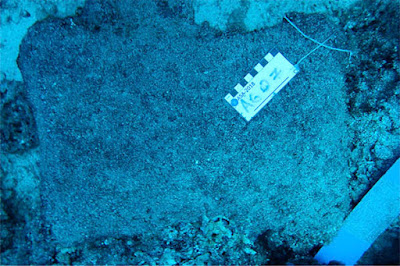For as long as people have been exchanging things there have been instances of customer dissatisfaction. The first-known record of a customer complaint is found in cuneiform writing on a clay tablet in the collection of the British Museum in London. Once again I am straying a little from the subject of rock art to an inscribed clay tablet, but I cannot help it, it is just so fascinating.
When deciphered, the tablet was found to contain “a complaint from a man named Nanni to a businessman named Ea-nasir that’s written in the Akkadian language in cuneiform script, one of the oldest forms of writing. Nanni complained to Ea-Nasir the wrong grade of copper ore had been delivered to him, and about misdirection and delay of a separate shipment.” (Deron 2019) This tablet, and thus the complaint, are dated to 3,800 years ago and come from the Mesopotamian city of Ur, now known as Tell el-Muqayyar in modern Iraq (Martin 2022).
It sounds just like a situation that would be familiar to everyone today, a shopper disappointed upon receipt of something that had been ordered. “Ea-nasir was a member of the Alik Tilmun, a guild of merchants based in Dilmun. Archaeologists discovered that he was a prominent copper trader. As it turns out, Ea-nasir was a pretty bad businessman and received multiple complaints from angry customers.” (Deron 2019)
The tablet from Nanni was translated by A. Leo Oppenheim, an Assyrologist at the British Museum, as follows:
“Tell Ea-nasir:
Nanni sends the following message: When you came you said to me as follows: ‘I
will give Gimil-Sin (when he comes) fine quality copper ingots.’ You left then
but you did not do what you promised me. Youu put ingots which were not good
before my messenger (Sit-Sin) and said: ‘If you want to take them, take them;
if you do not want to take them, go away!’
What do you take me
for, that you treat somebody like me with such contempt? I have sent as
messengers gentlemen like ourselves to collect the bag with my money (deposited
with you) but you have treated me with contempt by sending them back to me
empty-handed several times, and that through enemy territory. Is there anyone
among the merchants who trade with Telmun who has treated me in this way? You
alond treat my messenger with contempt! On account of that one (trifling) mina
of silver which I owe you, you feel free to speak in such a way, while I have
given to the palace on your behalf 1,080 pounds of copper, and umi-abum has
likewise given 1,080 pounds of copper, apart from what we both have had written
on a sealed tablet to be kept in the temple of Samas.
How have you
treated me for that copper? You have withheld my money bag from me in enemy
territory; it is now up to you to restore (my money) to me in full.
Take cognizance that (from now on) I will not accept here any copper ingots from you that is not of fine quality. I shall (from now on) select and take the ingots individually in my own yard, and I shell exercise against you my right of rejection because you have treated me with contempt." (Oppenheim 1967:82-3)
“The product he received was unlike the product he was shown and promised. In other words his expectations were not met. Ea-nasir oversold his copper. Nanni sought resolution to his problem several times. Had Ea-nasir Fine Copper Inc. set things right the first time the British Museum wouldn’t have this interesting artifact to display. The relationship between this buyer and seller would have been quickly restored. ” (Hyken 2015)
“The letter ends with Nanni saying that from this point forward he would carefully inspect every copper ingot he received and ship back any that didn’t meet his approval. It is clear that their relationship has been poisoned. Trust and confidence have deteriorated to the point that Nanni will certainly have his eyes open for a new supplier.” (Hyken 2015) You know, I think I have written that letter a few times in my life as well.
And not only Nanni: “a man named Arbituram sent a note to Ea-nasir complaining about why he hadn’t received the copper that he paid for. ‘Why have you not given me the copper? If you do not give it, I will recall your pledges. Good copper, give again and again. Send me a man,’ reads a rough translation of the tabled.” (Deron 2019) It sounds like Ea-nasir was rapidly muddying the customer pool.
Everyone who has ever ordered something advertised in a magazine, or online, and been somewhat disappointed with the final result should understand and sympathize. One example I can give is an ad common in popular magazines showing a necklace with a gold pendant about 3” across in the illustration, set with an emerald, which turns out to be about 5/8” when received (no, it was not my purchase – it happened to an disappointed friend), or like when we were kids and rapidly tore open the cereal box to find the prize inside which turned out to be a cheesy piece of plastic something-or-other.
It is stories just like this that make the study of history so fascinating, and fun. Next week – back to rock art.
NOTE 1: Adolph Leo Oppenheim’s 1967 book Letters From Mesopotamia: Official, Business, and Private Letters on
Clay Tablets from Two Millennia is now out of print.
NOTE 2: Images in this posting were retrieved from the internet with a search for public domain photographs. If any of these images are not intended to be public domain, I apologize, and will happily provide the picture credits if the owner will contact me with them. For further information on these reports you should read the articles listed below.
REFERENCE:
Deron, Bernadette, 2019, This 3,800-Year-Old Tablet Contains The World’s First Customer Service Complaint, 10 September 2018, updated 6 March 2019, https://allthatsinteresting.com/first-customer-service-complaint-ea-nasir, accessioned 18 May 2022.
Hyken, Shep, 2015, Oldest Customer Service Complaint Discovered: A Lesson from Ancient Babylon, 23 April, 2015, Forbes, https://www.forbes.com/sites/shephyken/2015/04/23/oldest-customer-service-complaint-discovered-a-lesson-from-ancient-babylon/?sh=247b6b7466f1
Martin, Andrew, 2022, The First Known Customer Compaint In History Came From Ancient Mesopotamia, 16 May 2022, https://historianandrew.medium.com, accessioned 22 May 2022.
Oppenheim, A. Leo, 1967, Letters from Mesopotamia: Official,
Business, and Private Letters on Clay Tablets from Two Millennia,
Translated and with an Introduction by A. Leo Oppenheim, University of Chicago
Press.










No comments:
Post a Comment